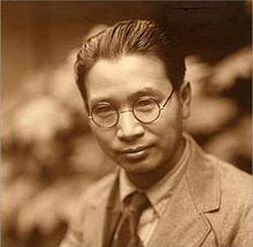 Toyohiko Kagawa (10 July 1888 – 23 April 1960)
Toyohiko Kagawa (10 July 1888 – 23 April 1960) The young Kagawa learned English and eventually converted to Christianity, at which point he was renounced by the remaining members of his original family. Kagawa was thus free to follow his new beliefs and he studied at Tokyo Presbyterian College, Kobe Theological Seminary, and from 1914 to 1916 at Princeton Theological Seminary in the United States.
The young seminarian was troubled, however, by the stress on doctrines which were often of no practical importance, and he developed a firm conviction that Christianity was a religion of action rather than just beliefs. Kagawa thus embarked on other studies in addition to his religious training and studied subjects such as genetics, anatomy and agriculture.
This stress on the practical aspects of life can already be seen in the fact that In 1909 Kagawa moved into a Kobe slum in order to serve as a missionary and social worker, and after completing his studies at Princeton he published his first influential work, Researches in the Psychology of the Poor, based on his experience of slum society, including what he had learned of the widespread practices of prostitution, drug use and even the practice of accepting money to care for children and then killing them.
Kagawa developed many avenues to employ Christian principles by which the poor could be helped, such as in the organization of labor and social cooperatives. He also fought for universal suffrage so that first all men, then women could vote. His often radical views in these areas led to his arrest on several occasions, but he was always released and continued his work. He was also a strong advocate of peace and in 1940 he was arrested yet again for making a public apology to the Republic of China for Japan's occupation of China.
Behind the public persona known for struggles and arrests, Kagawa tirelessly continued his basic work on behalf of the poor and those in need. He helped to organize relief work in Tokyo following the Great Earthquake of 1923 and also established a number of schools, hospitals, and Christian churches in Japan. Few Christians have ever impacted society in so many areas as Kagawa. The effects of his work were felt in so many different arenas that he gained international recognition for his efforts.
He was nominated for the Nobel Prize in Literature in 1947 and 1948 (in the course of his life he wrote over 150 books), and also for the Nobel Peace Prize in 1954 and 1955. After his death, he was awarded the second-highest honor of Japan (induction to the Order of the Sacred Treasure), and today he is commemorated each year on the anniversary of his death by the Evangelical Lutheran Church and the Episcopal Church of the United States.
Kagawa was always a practical person, directly applying Christianity in life. One of his most famous statements (and an inspiring one to those who know how much he accomplished) is: "I read in a book that a man called Christ went about doing good. It is very disconcerting to me that I am so easily satisfied with just going about.”
 RSS Feed
RSS Feed
